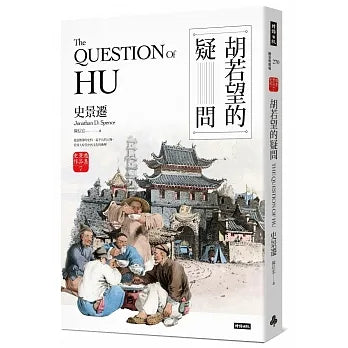▎從最微薄的史料、最平凡的人物,看到中西文化的衝擊 ▎
當代漢學家史景遷以跨時代巨著《追尋現代中國》奠定其漢學地位也在《康熙》一書中立體拼貼出帝王的樣貌但這次他筆下的人物,不是政治家、貴族,不是武士或高尚的隱士 而是出身微寒、只會抄寫文件的廣州人胡若望
自利瑪竇十六世紀到中國傳教以來,耶穌會教士不僅帶來西方的科學知開展了中西文化交流的大時代。
清康熙六十一年(西元一七二二年),潛心鑽研中國典籍的傅聖澤神父,雇用在廣州擔任教會守門人的胡若望,協助他回到歐洲做漢學研究。胡若望十九歲皈依天主教,識字又寫得一手好字,身處於大航海時代後亞洲最大的國際城市,胡若望有一個夢想:要親自前往羅馬,謁見教宗,然後把所見所聞告訴家鄉的親友。
傅聖澤提供的這份工作正是他夢寐以求。
不過,這趟海外工作之旅卻彷彿是一場失語的過程。除了遠途航行的疲憊,加上語言不通與文化的隔閡,讓胡若望這趟旅程的期望不斷流失。他不懂,為何西方的女性可以在大街上遊走、自己向十字架叩頭錯在何處、把身上華服脫下來給乞丐穿不行嗎?這些都是中國人的分際跟美德。在百般困惑之下,胡若望開始行蹤不定,他想完成自己的西方遊記,於是在巴黎街頭遊蕩,最後傅聖澤只好將他囚禁於夏宏通精神病院。
當時巴黎眾人對胡若望的觀感是粗俗、不懂禮儀、個性頑但更多則是文化上的衝突,就如天主教教會內部會爭論該如何看待中國人的祭祖禮儀與傳統典籍。儘管胡若望在中國史上是無法被納入史冊的小人物,然而其史料卻藏於世界三大檔案庫中,也許,除了顯現教會在中國的文化活動軌跡、漢學在歐洲的發展外,更多是世界浪潮的衝擊,傳統中國的斤重大門,自此再也無法闔上。
名人推薦
「時而驚險、荒謬,又讓人意猶未盡,史景遷細膩地描述這個扣人心弦的歷史故事,並伴隨著深刻的道德意味。巧妙的學術之作。」—— 《柯克斯書評》
「透過文學一般的敘事風格,史景遷得以從史料本身找出胡若望的諸多疑問,又不會強加答案給讀者。」——《紐約時報》
「這本書能引發讀者諸多的反思與深刻的情感,他們不只會留意故事的走向,也會細細品味其意涵。」——《洛杉磯時報》
